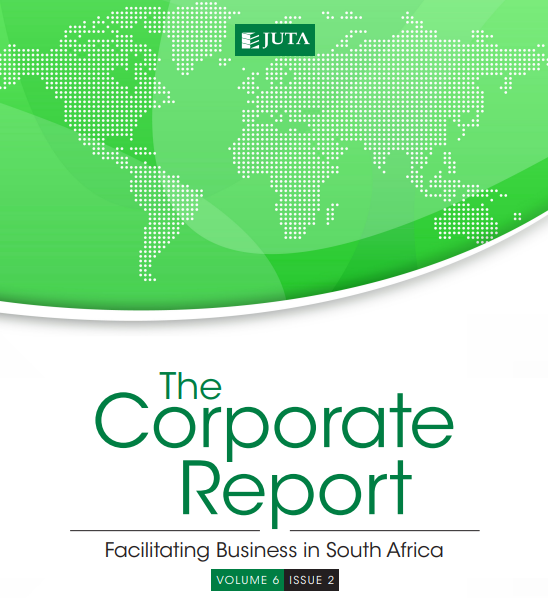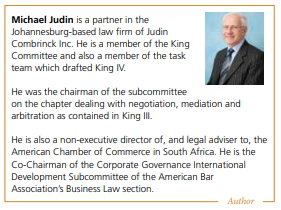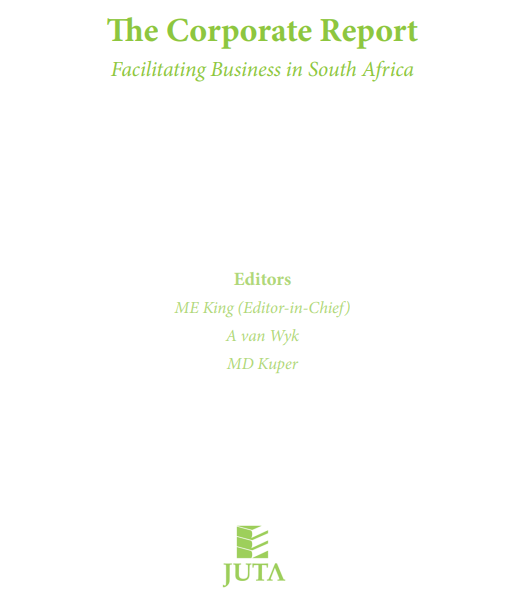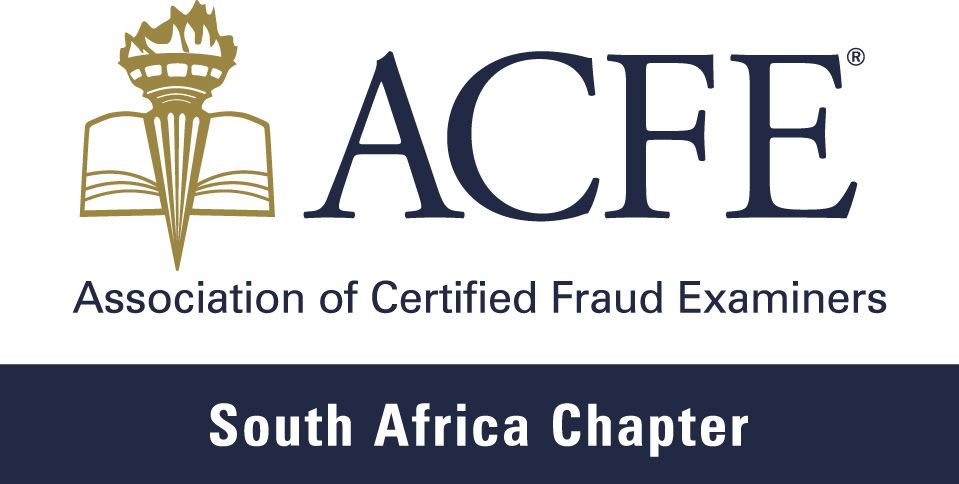The Corporate Report: Facilitating Business in South Africa
The King Report and Code: An integral and important part of South Africa’s common law
Michael Judin

The King Report on Corporate Governance has been cited as ‘the most effective summary of the best international practices in corporate governance’.
A corporation is a figment of the legal imagination. It is a mark in a registrar’s book, a creature without a physical being or substance. You cannot taste, feel or smell a corporation. It is a ghost, a phantasm.
Corporate law has to choose between collisions of the four main interests:
- creditors;
- shareholders;
- management; and
- the board of directors.
This is not just a functional choice; it is a moral choice. In addition, some people believe that companies owe special duties to the public in the nature of altruism or charity beyond those owed by ordinary individuals.1
Both Nelson Mandela (also known as Madiba) and retired Supreme Court of South Africa Judge, Professor Mervyn E King, must have had this in mind when Madiba persuaded Mervyn in 1992 to write a corporate governance code for the new South Africa. Mervyn King had been approached by the Institute of Directors in South Africa (IoDSA) to chair a committee on corporate governance. This was viewed as an opportunity to draft guidelines for our fellow citizens on how to direct and manage corporations, having been deprived of doing so because of our discriminatory apartheid laws.
The King Committee’s report was the first report of its kind in South Africa and the copyright in same, as also the copyright in all subsequent King Reports and Codes vests in the IoDSA.2
Mervyn King directed the King Committee away from a shareholder-centric governance model to an inclusive stakeholder model. It changed the thinking of corporate boards around the world.
The King Code on Corporate Governance is non-legislative, based on good governance principles and practices
The King Code on Corporate Governance is nonlegislative, based on good governance principles and practices but is a listing requirement of the Johannesburg Stock Exchange (JSE). It is often included in contractual arrangements between parties thus making it binding on the parties to that contract. In my opinion, the decision by Mervyn King to include the JSE on his Committee and to ask the then Chairman of the JSE, Roy Anderson, and the doyen of the JSE, Max Borkum, to persuade the JSE to make the King I Report a listing requirement was one of the most important decisions that gave regulatory recognition to the King Report and Code. Roy Anderson did the JSE a favour in persuading them to adapt the King Code because today the JSE is seen to be the best stock exchange in the world. I have no doubt that Mervyn King and the Committee members could not have foreseen that the King Code in its three iterations to date would become both an integral and important part of South Africa’s common law.

What is South Africa’s common law?
South African law, in general, comprises common law and statutory law. South Africa’s common law is composed of the foundational Roman-Dutch legal principles as modified and interpreted by judicial precedent. The decisions of the High Court are binding on all lower courts, and in turn, the High Court is bound by decisions of the Constitutional Court. In addition, the High Court considers itself bound by its own decisions unless convinced that an earlier decision on the point in issue is patently wrong. Judicial decisions are thus themselves a source of law. Overarching this legal framework is the Constitution, against which all law must be measured for consistency, and which exerts a powerful influence over the development of the law.
A visit to http://www.elawnet.co.za/article_docs/ CASES_REFERRING_TO_THE_KING_REPORT. pdf will take you on a journey through the cases in the various divisions of the High Court of South Africa, where judges have made reference to the King Report. With their judgements, the King Report and Code have been made part of South Africa’s common law.
When the task team drafting King IV commenced their work, one of the important issues raised with Mervyn King, as Chairman, was the challenge to ensure that King IV was aligned to the now firmly entrenched common law principles taken from King I, King II and King III. I believe that we have achieved this and it is hoped that King IV (and the subsequent King Reports that will inevitably follow because the corporate milieu keeps changing) continue to enrich South Africa’s common law.
The King Report on Corporate Governance has been cited as ‘the most effective summary of the best international practices in corporate governance’.3
It is the hope of the King Committee that King IV will continue the reputation of its predecessors of being one of South Africa’s most valuable assets of which we can all be so proud.

___________________________________________________
1 R Wood ‘The rise of the lawyers’ (2016) 17:2 Business Law International.
2 Wikipedia ‘King Report on Corporate Governance’ and the references therein referred to, available at https://en.wikipedia.org/wiki/King_Report_on_Corporate_Governance (accessed 15 July 2016).
3 Steve Banhegyi Management: Fresh Perspectives (Pearson Education South Africa 2007) 317.
NOTE TO CONTRIBUTORS
The Corporate Report invites submission of manuscripts, in English, on subjects that relate to the South African corporate environment and of interest to the professional readership of the journal. Topics include but are not limited to:
- Corporate governance and corporate citizenship
- Compliance (laws, codes, standards, regulations)
- Integrated and financial reporting
- Boards and directors
- Sustainability
- Ethics
- Risk and internal audit
- Governance of information technology
- Stakeholder relations
The Corporate Report accepts manuscripts of two types:
- Long articles: These are feature pieces providing a detailed analysis of the topic under discussion, ideally between 2 500 and 4 000 words in length.
- Short articles: These are shorter, more focused pieces of between 500 and 2 000 words.
An article will be considered for publication on the following conditions:
- The author must give the publisher assurance that the manuscript has not, in whole or in part or in substance, been published or offered for publication elsewhere;
- The author must properly acknowledge the contribution made by others in the production of his or her manuscript by footnoting all references;
- The editors reserve the right to make the changes they consider necessary or desirable in order to
- bring the manuscript into the house style of The Corporate Report;
- correct spelling and punctuation errors, as well as errors in syntax, use of idiomatic language, and so on;
- eliminate ambiguity, illogicality, tautology, circumlocution and redundancy;
- produce or improve accuracy and coherence;
- avoid possible criminal or civil liability.
The author of a manuscript accepted for publication must please supply a bio of between 100 and 300 words, detailing his or her academic and professional qualifications and status, as well as a photograph.
All material to be considered for publication should be sent to the publisher:
mwagner@juta.co.za
SUBSCRIPTION
The Corporate Report is published three times a year and subscription is paid upfront for all three issues.
Subscription within the Republic of South Africa (RSA):
R345.00 (including VAT but excluding postage and packaging)
Subscriptions should be directed to Juta Law Customer Services:
Telephone: 021 659 2300
Fax: 021 659 2360
E-mail: orders@juta.co.za

